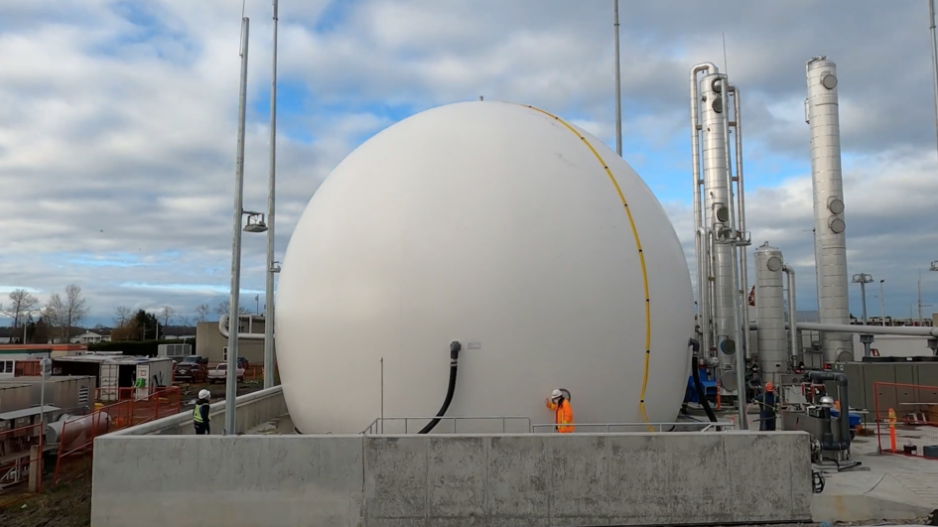By September 2022, the City of Richmond noticed something wasn't right — several sections of a study that gauged the feasibility of using gas long into the future had been removed without any explanation.
Commissioned by FortisBC, the B.C. government and the BC Bioenergy Network, the deleted passages presented the benefits of a counter-narrative in which heat pumps were found to be “six to eight times more efficient than heating with gas.”
Communications obtained by Glacier Media through a freedom of information request showed the full extent of those edits. FortisBC and the other members of the report's steering committee said the passages were removed because they were “out of scope, inaccurate or could not be substantiated by data reviewed during the study.”
In the first of this two-part series, Nanaimo city councillor Ben Geselbracht described the deletions as "misleading" and lying by omission.
“They're creating the data to support what they want to be heard,” added Richmond Coun. Michael Wolfe.
Peter Russell, Richmond’s director of sustainability and district energy, said the deletions in the gas report are just one more data point showing how FortisBC is manufacturing a conversation that suits its long-term goals.
“We connected the dots,” Russell said.
A '$750-million subsidy' paid for by existing customers?
FortisBC is currently locked in an ongoing regulatory approval application with the BC Utilities Commission (BCUC). If approved, the application would allow the company to provide customers in newly built homes with 100 per cent renewable natural gas (RNG) at what the City of Richmond claims is below-market cost.
RNG is nearly identical to fossil gas at the molecular level, so if it seeps into the air, you release a greenhouse gas over 80 times more potent than carbon dioxide over a 20-year period. Unlike fossil gas, RNG is made up of methane captured from wastewater treatment plants, landfills, wood waste and manure from farm animals.
Advocates of RNG tout it as a carbon-neutral solution that doesn't require a massive overhaul of public and private infrastructure. FortisBC plans for 15 per cent of its natural gas supply to come from renewable sources by 2030, claiming it will reduce customer emissions by 30 per cent.
But several B.C. municipalities see FortisBC's RNG plans differently, and say it could end up costing residents more than the company admits.
In 2022, Richmond banded together with a number of other jurisdictions — including Metro Vancouver, and the cities of Vancouver, Surrey, Victoria, and districts of North Vancouver and Saanich — to oppose FortisBC's plan as interveners in the BCUC regulatory process.
The interveners hired energy consultant Peter Strunk — a New York-based expert who has spent years tracking the oil and gas industry — to systematically unravel FortisBC’s argument RNG should be used in all new buildings.
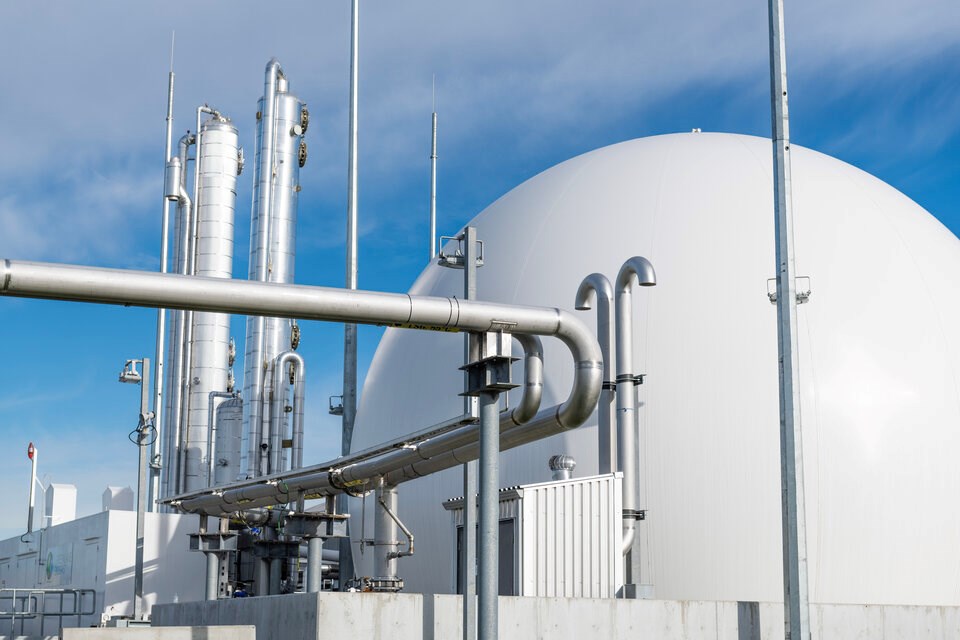
Metro Vancouver captures renewable natural gas emitted from the Lulu Island Wastewater Facility that would otherwise bleed into the atmosphere. Some say the captured gas should be used as a last resort in old buildings that are hard to decarbonize. Metro Vancouver
The BCUC renewable gas application process has been paused since May, but the utilities commission said it is preparing to restart the process this month.
FortisBC says its RNG plan is on track. The company said it has already signed contracts to ensure 10 per cent of its gas supply comes from RNG.
But even if Fortis hits its RNG targets over the coming years, most of the contracted RNG would come from outside B.C. and never actually flow into the province’s gas stoves and boilers, according to the interveners' submissions. Customers would still receive a mostly fossil gas mix and pay international RNG suppliers for offsets, similar to carbon credits, Russell said.
At Metro Vancouver's July 28 board meeting , FortisBC's director of energy solutions Jason Wolfe confirmed renewable gas injected into B.C.'s gas network will not physically get routed to new homes, but will mix with the rest of the molecules in the system and will be accounted for through an audit system. Wolfe said Fortis would need to source RNG from outside B.C. until at least 2030.
“Over the longer term, B.C. has enough renewable and low carbon gas to support the needs that we currently have today,” said Wolfe, pointing to the altered gas study.
But according to the BCUC interveners, the cost of renewable gas cannot compete with running electric heat pumps. The added cost of that RNG, they say, would be paid by existing Fortis customers who would have to pay a premium to receive the low-carbon gas. Richmond claims that adds up to a $750-million subsidy.
“It’s too big and we’re saying it’s not equitable,” Russell said.
RNG should be treated like a 'scarce resource'
FortisBC has signed contracts with a number of RNG producers to supply gas over the coming years. In 2020, it signed a contract to source RNG from wood waste at a facility in Fruitvale, B.C., “a first for North America,” according to the forestry industry publication Canadian Biomass. Fortis also has agreements for RNG facilities harvesting gas from compost in Abbotsford, agricultural waste in Ontario, and from a site in Iowa run by Shell Energy North America.
Fortis also has a contract with Metro Vancouver to supply RNG captured at its Lulu Island Wastewater Facility in Richmond.
In their submissions, the group of intervening municipalities and regional governments question Fortis's ability to ensure a long-term supply of RNG as competition for the gas grows.
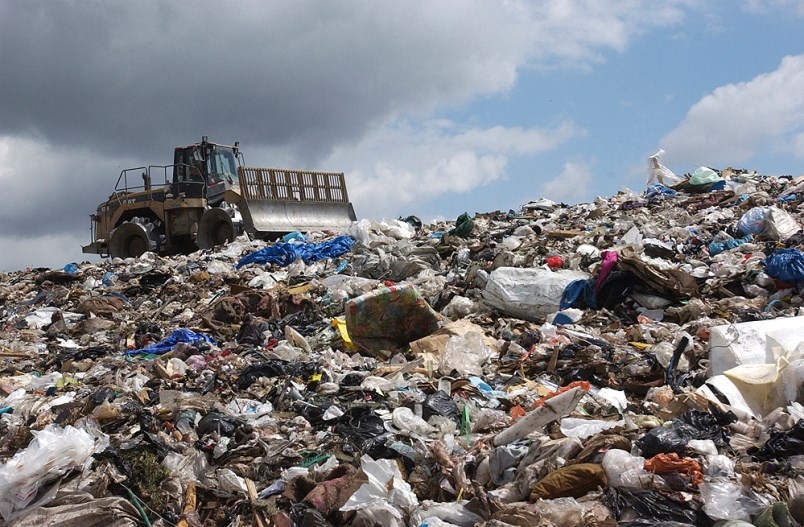
FortisBC and the City of Vancouver will work together to harness renewable natural gas from the city's landfill in Delta. File photo Delta Optimist
Instead of scaling up RNG as a major source of heat in new buildings, Russell said the gas should be considered a “scarce resource” sent to existing buildings where electrification is not economically feasible. Introba, one of the world’s largest building engineering and consulting firms, came to similar conclusions in a May 2023 report, finding RNG should be treated as a “last resort option for new construction.”
“There's a policy vacuum at the provincial level, and what's happening in our view is that Fortis is seeking to take advantage of that policy vacuum and putting forth aggressive plans that sometimes don't add up,” said Russell.
Sorace said FortisBC is committed to working with the province to meet its climate goals, but that "the most affordable and practical path forward" requires increasing renewable and low-carbon gases alongside electricity.
"They were designed to work together and should continue doing so to deliver energy to British Columbians," she said.
A call for regulatory overhaul
Richmond council has sent letters to the B.C. government and Legislative Assembly calling on the province to step in and accelerate the phase-out of gas heating. In response, Metro Vancouver’s board voted to open up talks with the province last week.
But the requests to the province go deeper, claiming the leadership of the BC Utilities Commission does not have a clear separation from the entities it regulates.
Richmond points to the regulator’s deputy chair, Anna Fung, who spent more than 15 years as senior council and chief privacy officer for Terasen Inc., FortisBC’s corporate predecessor. Thomas Loski, a BCUC sitting commissioner, spent most of his 34-year career in senior management and executive positions with FortisBC and its predecessors, writes Russell in a May report to council.
Russell said there's also been a concerted attempt by the BCUC to regulate Richmond's attempts to create its own clean energy solutions.
For more than a decade, Richmond has planned to scale up heat energy recovery, a technology the captures heat produced at the Lulu Island Wastewater Facility. Instead of gas boilers or heat pumps warming individual homes, the technology recovers heat generated from wastewater and pumps it through pipes to heat entire neighbourhoods. Metro Vancouver estimates that if the technology were expanded, there's already enough heat in the wastewater system to serve more than 700 highrise buildings.
“We believe [BCUC] is a captured regulator and they're working for gas interests,” said Russell.
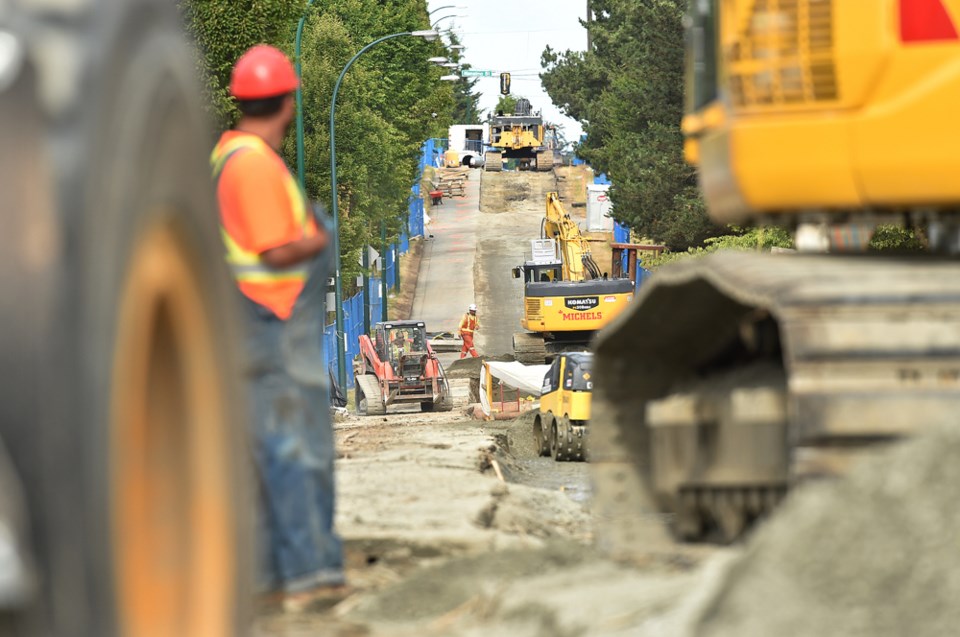
FortisBC replaces 20 kilometres of gas line between Coquitlam and Vancouver. Municipalities have challenged FortisBC in court in recent years for having to bear some of the cost of pipeline replacement projects. Photo Dan Toulgoet
In May, the B.C. Court of Appeal dismissed Richmond’s allegations claiming BCUC commissioner bias.
“We take commissioner impartiality very seriously — it's at the core of what we do as an independent regulator,” said BCUC communications head Krissy Van Loon.
Van Loon added that prospective commissioners face a comprehensive review process before the B.C. government appoints them to serve.
“Industry experience is an asset, giving commissioners valuable insight into technical issues that may arise during our processes,” she said.
The court is still considering whether the utilities commission should have jurisdiction over Richmond’s district energy plans.
Cities taking on fossil fuel companies
A similar battle over the future of gas is playing out across North America, with mixed results.
Washington State’s building code now requires new multi-unit residential and commercial buildings to have all electric heating by 2023.
In California, where more than 60 cities and counties are considering all-electric building policies, the state updated building codes to require builders to include electric heat pumps. If they don’t want to go that route, developers can improve a building's energy efficiency instead.
The gas industry has pushed back, with Southern California Gas Co. reinventing the old industry slogan “cooking with gas” as a talking point to target communities of colour, according to reporting from the LA Times.
Meanwhile in Canada, Quebec banned the replacement of existing oil burning heating systems with a fossil fuel alternative such as natural gas back in 2021.
And in 2022, the Ontario Energy Board decided to turn down an Enbridge Gas application to replace a pipeline serving the City of Ottawa. The decision, which one expert observer said sent “minor shock waves” through the energy regulator and municipalities, cited the City of Ottawa’s community electrification plan and the potential to downsize the pipeline as gas demand waned.
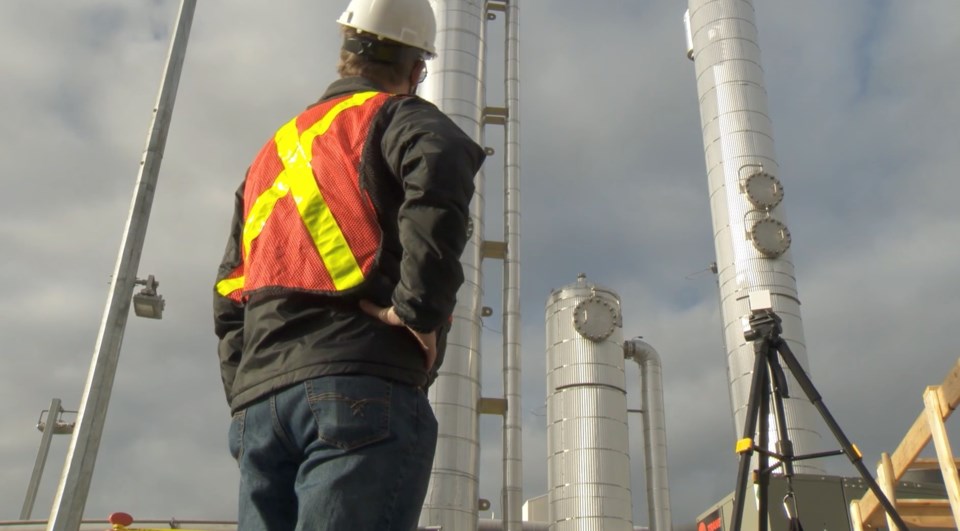
Jeff Carmichael, business development manager with Metro Vancouver, stands in front of the newly installed cleaning system that will purify renewable natural gas pulled from the Lulu Island Wastewater Facility on its way to FortisBC’s grid. Richmond plans to harvest heat from the same facility. Metro Vancouver
In Europe, local district heating plans have gained popularity across Denmark, Germany, the Netherlands and the United Kingdom. But Russell says the BCUC has consistently blocked Richmond’s efforts to manage the heating of its own city.
“There are utilities in Europe and North America that have requirements on gas regulators that will ultimately see them rationalize or retreat their infrastructure,” Russell said. “Not all provinces are regulating district energy systems.”
“So why is the BCUC doing that?”
Van Loon said the BCUC’s job is to provide “objective, well-reasoned, and evidence-based decisions” that serve the interests of B.C.’s ratepayers. She said the BCUC would respect the court’s decision over regulating Richmond’s district energy system.
But for Richmond city councillor Michael Wolfe, the council liaison for the city-owned Lulu Island Energy Company, the city has been effectively handcuffed for finding a viable alternative to gas.
“I am sick and tired of other levels of government basically clouding the issue, preventing the right solutions, passing the buck,” he said.
“It’s almost like we're being attacked for finding ways to do this.”

